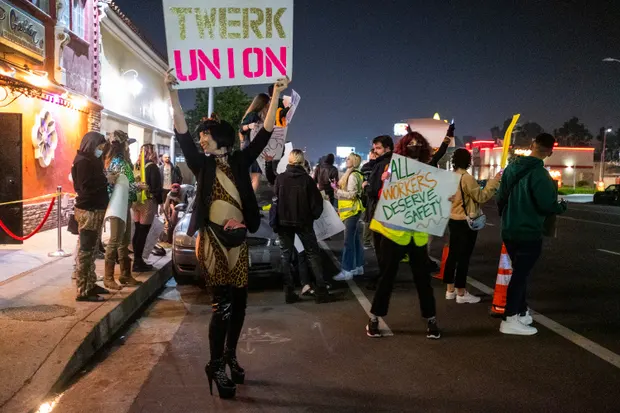
The momentous triumph was solidified when all 17 dancers unanimously voted in favor of unionization on Thursday morning. This historic event signifies the first occasion in which the Actors Equity Association, a long-established union representing stage actors, singers, and dancers, will extend its representation to include strip club workers, as stated by the union.
Throughout their campaign, the strippers employed vibrant and costumed protests, attracting prominent figures to express their support. Chris Smalls, the president of the Amazon Union, and Tom Morello of Rage Against the Machine, both stood in solidarity with the dancers. For Charlie, a 23-year-old dancer at Star Garden, sacrificing prime weekend nights for eight months last year to participate in picket lines posed financial challenges. However, she firmly believed that these sacrifices were worthwhile. She expressed, “The sacrifices we made were definitely sacrifices, but it was for something bigger than us.” The dancers were striving for a future where unionization would be accessible to strippers who desired it, a cause greater than the struggle to meet rent payments.
The campaign, initiated in March 2022, gained momentum due to dancers’ claims of unsafe working conditions and instances of dancers being fired in retaliation for addressing customers’ perilous behavior.
The dancers at Star Garden Topless Dive Bar in North Hollywood have been engaged in a campaign advocating for improved workplace conditions, better compensation, and access to health insurance. Despite the fact that Actors’ Equity, a union representing over 50,000 workers, has not previously organized strip club employees, they acknowledged that the concerns raised by the strippers were similar to those of other performers, encompassing issues such as wage theft and post-show security. Kate Shindle, the union president, commended the Star Garden dancers as “absolute warriors” throughout the extensive process.
In addition to addressing sexual harassment and dancer safety, the union campaign emphasized labor concerns that are shared by strippers and other workers alike, including workplace injuries that are prevalent due to the physically demanding nature of their work, thus highlighting the necessity of health insurance. Charlie, a dancer at Star Garden, emphasized the toll that performing in six- to eight-inch heels nightly takes on their bodies. Moreover, she highlighted the need for mental health support, as patrons often seek someone who will listen to their struggles and display empathy, drawing parallels between aspects of the job and the emotional labor performed by therapists or social workers. Charlie humorously remarked, “I would say most of my social work experience has been in my underwear.”
The union victory builds upon the efforts of sex workers who have long campaigned for safe working conditions and receives significant support from the advocacy group Strippers United. After enduring over a year of legal battles, including the club’s bankruptcy filing, the union and the owners of Star Garden reached a settlement, enabling the dancers to proceed with a union vote and the reopening of the club.
An Ruda, an attorney representing Star Garden, expressed the club’s commitment to engage in good faith negotiations with Actors’ Equity to establish a groundbreaking collective bargaining agreement that is fair to all parties involved. The club stated that it has always been an equitable employer that respects the rights of its employees.
The North Hollywood dancers hope that their triumph will inspire similar unionization efforts in strip clubs across the United States. Lilith, a dancer at Star Garden, declared that this victory is not only for the dancers at their club but for the entire strip club industry. The vote at Star Garden comes ten years after the closure of the Lusty Lady, a worker-owned club in San Francisco that became unionized with the Service Employees International Union in 1997. Although the Lusty Lady had a commendable run, its unionization did not ultimately ignite widespread organizing efforts in strip clubs throughout the country, as workers had hoped.
Kristina Zinnen, a former Lusty Lady dancer who later became a labor lawyer in San Francisco, expressed that she had spoken with around 10 groups of strippers over the years who were attempting to organize their workplaces, but none of those campaigns achieved success. Zinnen identified one of the major obstacles to organizing strippers as finding the appropriate union to support them.
The involvement of Actors Equity, a powerful and well-established organization, in the unionization efforts was deemed “highly significant” by Zinnen and could potentially indicate a broader interest in organizing other clubs.
The dancers at Star Garden took a strategic approach to their picketing, aiming to entertain both club owners and customers and convey the message that they were the lifeblood of the club. Charlie explained that picketing on a North Hollywood street corner until the early hours of the morning required endurance and sometimes raised safety concerns. Nevertheless, the dancers focused on maintaining a charming demeanor while advocating for labor rights, employing flirtatious tactics representative of their profession. They encouraged patrons to return another time, visit a different club, or join them on the picket line instead of entering the establishment.
Each picketing night featured a different theme with costumes and props, ranging from witches to pageant nights to dad nights complete with a grill. On one occasion, the theme highlighted the environmental and safety violations they were protesting against, with dancers dressing up as “broken glass” and “a hole in the stage.”
The strippers also cultivated a social media following and utilized contributions from supporters to sustain the 15-month-long protest. However, most dancers also took on additional jobs, such as working at grocery stores and various gigs, to cover their rent expenses. Charlie acknowledged that it could be disheartening when longstanding patrons chose to cross the picket line, but she emphasized that the majority of their customers were incredibly supportive. Some actively endorsed the labor movement, while others simply heeded the dancers’ advice to return at a later time.